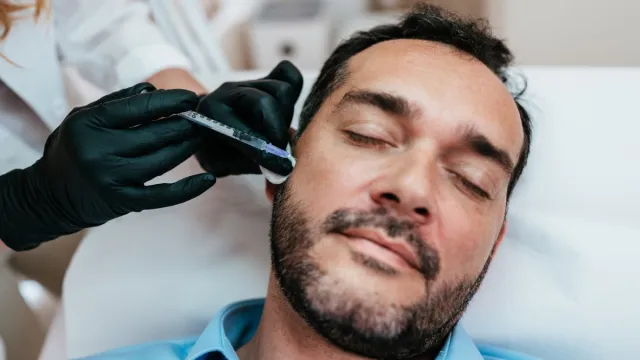Fake Botox Injections Are Sending People to the Hospital, U.S. Health Officials Caution

Some people will do anything to stop signs of aging—and yes, that includes getting Botox injections. While this popular cosmetic treatment is often used to reduce the appearance of wrinkles, it can also help people with certain medical conditions such as migraines. But no matter the reason you might be getting Botox, you should be aware that health officials believe fake injections could be the culprit behind recent hospitalizations in at least one state.
RELATED: 4 Reasons to Get Botox That Have Nothing to Do With How You Look.
The Illinois Department of Public Health (IDPH) issued a new alert on April 8 to warn about the possible connection. According to the warning, state and local health departments are currently working with the Illinois Department of Professional Regulation (IDFPR) to investigate the “hospitalization of two people who received injection of Botox-like substance in La Salle County.”
The IDPH states that the two patients reported symptoms resembling botulism after getting Botox injections from a licensed nurse in LaSalle County who was not authorized to provide this service. They believe this may have resulted from a “possibly counterfeit version” of Botox.
Both patients had to be hospitalized as a result of their symptoms, which included blurred/double vision, droopy face, fatigue, shortness of breath, difficulty breathing, and hoarse voice.
“Illinois residents should exercise caution when considering cosmetic treatment,” IDPH Director Sameer Vohra, MD, said in a statement. “Receiving these treatments in unlicensed, unapproved settings can put you or your loved ones at serious risk for health problems.”
RELATED: FDA Issues New Warning on Hidden Dangers of OTC Pain Relievers: “Stop Right There.”
The IDPH also cautioned healthcare providers to be on a “heightened lookout” for other patients who may present with symptoms similar to botulism—which is a “rare but serious illness caused by a toxin that attacks the body’s nerves and causes difficulty breathing, muscle paralysis, and even death,” according to the Centers for Disease Control and Prevention (CDC).
That toxin is made by the Clostridium botulinum, the same type of bacterium used in Botox. But the cosmetic drug is produced in a lab using a specific type of the bacteria for safety, according to the Cleveland Clinic. Technicians also “dilute and sterilize the botulinum toxins” used in Botox injections to prevent botulism.
Still, problems can occur if the drug is not produced or administered in accordance with approval guidelines from the U.S. Food and Drug Administration (FDA). For example, the CDC says that you can develop iatrogenic botulism—one type of botulism that is caused by medical examination or treatment—if too much botulinum toxin is injected into your body.
“You can prevent iatrogenic botulism by getting injections of botulinum toxin only by licensed practitioners,” the CDC states on its website.
The FDA has warned in the past that counterfeit versions of Botox have been found in the U.S. As the agency explains, fake forms of this cosmetic drug “are considered unsafe and should not be used,” as it cannot be confirmed that they meet U.S. safety standards.
“Please only seek cosmetic services under the care of licensed professionals trained to do these procedures and who use FDA approved products,” Vohra warned. “If you are experiencing any health problems after a recent cosmetic treatment, please contact your healthcare provider immediately for help and assistance.”
Illinois is not the only state investigating cases of botulism-like illnesses, however. The IDPH indicated that a similar cluster was recently reported by the Tennessee Department of Health (TDH). According to their own report, four patients in the state experienced botulism-like signs and symptoms following cosmetic injections, and two had to be hospitalizations.
“Ongoing investigation suggests that the product administered was counterfeit,” the TDH noted.
Best Life offers the most up-to-date information from top experts, new research, and health agencies, but our content is not meant to be a substitute for professional guidance. When it comes to the medication you’re taking or any other health questions you have, always consult your healthcare provider directly.
- Source: IDPH Alerts Healthcare Providers to Cluster of Illnesses Resembling Botulism from Possibly Counterfeit Botox
- Source: CDC: About Botulism
- Source: Cleveland Clinic: Botox (Botulinum Toxin)
- Source: FDA: Medication Guide Botox
- Source: CDC: Kinds of Botulism
- Source: CDC: Botulism Prevention
- Source: FDA: Counterfeit Version of Botox Found in the United States
- Source: TDH Investigating Cases of Botulism-Like Illness Following Cosmetic Injections